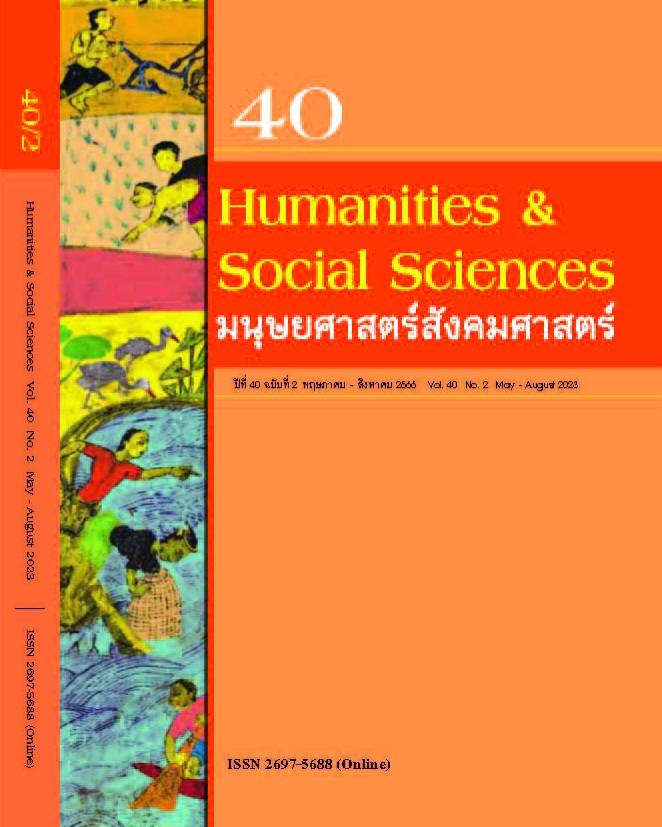ความผูกพันต่อองค์กรของบุคลากร : กรณีศึกษามหาวิทยาลัยขอนแก่น
Organizational Commitment : A Case Study of Khon Kaen University.
Keywords:
Engagement, Organization, Human Resource Management, Khon Kaen UniversityAbstract
Organizational commitment to an organization is an essential factor in organizational management. Employees committed to the organization are dedicated and work efficiently, creating the best results, and feel a part of the organization to provide sustainable organizational development. The purpose of this study was 1) to study demographic factors and human capital factors that affect employee commitment to the organization of Khon Kaen University and 2) to study the 11 factors that affect employee commitment to the organization of Khon Kaen University. The researcher identifies the sample group in this research as Khon Kaen University personnel who answered the satisfaction and commitment questionnaire of Khon Kaen University personnel. A total of 1,196 people were collected by collecting data in the form of secondary data from the database of the Human Resources division, Khon Kaen University conducted the satisfaction and commitment questionnaire of Khon Kaen University personnel Between 1-30 September 2022. The data were analyzed using multiple regression statistics. The research found that the demographic factors affecting organizational commitment were gender, age, marital status, and place of origin. The human capital factors affecting organizational commitment were educational qualifications. The 11 factors affecting organizational commitment were salary and benefits, job characteristics or responsibilities, colleagues, job security, and Organizational relationship building activities. Therefore, this research suggests guidelines for universities to create a fair compensation system, a system for evaluating actual performance for salary promotion, and more diverse options for using benefits that meet the actual needs of employees. Analyze the job characteristics of each position with individual participation to determine competencies and key performance indicators. Promote the development of effective communication skills, create a team in the organization, encourage staff to have future-oriented skills, provide complete work equipment, create safe working environments with good conditions, and engage in recreational activities that connect people in and outside of the organization.
References
กนกพร กระจางแสง และ วิโรจน์ เจษฎาลักษณ์. (2560). อิทธิพลของแรงจูงใจในการทํางานและการสนับสนุนจากองค์กรที่ส่งผลต่อคุณภาพในการปฏิบัติงานผ่านความผูกพันต่อองค์กรของบุคลากรโรงพยาบาลนครธน.วารสารวิชาการมหาวิทยาลัยธนบุรี, 26, 116-129.
กองทรัพยากรบุคคล มหาวิทยาลัยขอนแก่น. (2565). ข้อมูลการลาออกของบุคลากรมหาวิทยาลัยขอนแก่น. สืบค้นเมื่อ 11 พฤศจิกายน 2565, จาก https://hr.kku.ac.th/wphrdkku/
เจริญจิตร เศวตวาณิชกุล, จรัญญา ปานเจริญ, เอกพงศ กิตติสาร. (2018). การสรางความผูกพันของพนักงาน: กรณีศึกษาโรงงานประกอบรถยนตในประเทศไทย. วารสารดุษฎีบัณฑิตทางสังคมศาสตร, 8(2), 28-42.
ตรีภพ ชินบูรณ์. (2560). คุณภาพชีวิตในการทำงานกับความผูกพันต่อองค์กรของพนักงานมหาวิทยาลัยสายสนับสนุน มหาวิทยาลัยนครพนม. วารสารมหาวิทยาลัยนครพนม, 7(3), 1-9.
ธิดารัตน์ สวนเศรษฐ์ ระพิน ชูชื่น และธนวิน ทองแพง. (2562). ปัจจัยที่ส่งผลต่อความผูกพันองค์กรของพนักงานสายสนับสนุนวิชาการในมหาวิทยาลัยบูรพา. e-Journal of Education Studies, Burapha University, 1(6), 55-67.
ชนิดาภา หนูนวลวุฒิวงศ์, ปนัดดา ศรีแจ่ม และ กฤษณ์ วิทวัสสำราญกุล. (2564). ปัจจัยคุณภาพชีวิตการทำงานที่ส่งผลต่อความผูกพันต่อองค์กรของพนักงานระดับปฏิบัติการ ท่าอากาศยานดอนเมือง. การประชุมวิชาการระดับชาติ “วิถีใหม่ในสังคมที่เปลี่ยนแปลง”. กรุงเทพฯ: มหาวิทยาลัยกรุงเทพ.
ปาลิดา ไทยวัชรมาศ ทิพย์วรรณา งามศักดิ์. (2565). ความสัมพันธ์ของปัจจัยที่ส่งผลต่อความผูกพันต่อองค์กรกับความผูกพันต่อองค์กรของพนักงานหน่วยงานบริหารจัดการกลาง สำนักงานอธิการบดี มหาวิทยาลัยขอนแก่น. การประชุมวิชาการทางธุรกิจและนวัตกรรมทางการจัดการระดับชาติ. ขอนแก่น: มหาวิทยาลัยขอนแก่น.
พีรยา ทรัพยสาร และประสพชัย พสุนนท. (2563). ความสัมพันธ์ด้านคุณภาพชีวิตในการทำงานและความผูกพันต่อองค์กรของอาจารยม์ หาวิทยาลัยเอกชนแห่งหนึ่ง. RMUTI JOURNAL Humanities and Social Sciences, 7(1), 99-113.
มณฑิชา เป้าบุญปรุง และ การุณันทน์ รัตนแสนวงษ์. (2559). ปัจจัยที่มีผลต่อความผูกพันกับองค์การของพนักงานมหาวิทยาลัยราชภัฏพระนคร. วารสารวิจัยราชภัฏพระนคร สาขามนุษยศาสตร์และสังคมศาสตร์, 11(2), 99-112.
วรรณภา เหล็กเพชร และ ปัทมาวรรณ จินดารักษ์. (2561). วัฒนธรรมองค์การและความผูกพันของบุคลากรโรงเรียนสารสาสน์วิเทศเชียงใหม่. วารสารวิชาการบริหารธุรกิจ, 7, 32-44.
ศิริลักษณ รักเจียม ณัฐวัชร ประทีป ณ ถลาง และ จุรีวรรณ จันพลา. (2564). ความผูกพันตอองคกรและความสุขในการทำงานของบุคลากรสังกัด สำนักงานอธิการบดี มหาวิทยาลัยในกำกับของรัฐแหงหนึ่ง. วารสารวิจัยมหาวิทยาลัยราชภัฏหมูบานจอมบึง สาขามนุษยศาสตรและสังคมศาสตร์, 9(2), 16-31.
ศิริวรรณ บัวโชติ และ กัมปนาท วงษ์วัฒนพงษ์. (2565). ความผูกพันของข้าราชการธุรการที่มีต่อสำนักงานอัยการภาค 6. Journal of Modern Learning Development, 7(5), 140-152.
สุวรรณี จริยะพร. (2560). แบบจำลองเชิงสาเหตุการเป็นสมาชิกที่ดีต่อองค์การของบุคลากรในสถาบันอุดมศึกษา เอกชนภาคกลางตอนล่าง. วารสารมนุษยศาสตร์สังคมศาสตร์ มหาวิทยาลัยขอนแก่น, 34(1), 226 – 246
อรวรรณ มากสังข์ และ รวิดา วิริยกิจจา. (2560). ปัจจัยองค์กรที่มีผลกับความผูกพันต่อองค์กรของพนักงานธนาคารออมสินสาขาในเขตชลบุรี 2. I-Journal of Business Research. 11, 34-46.
เอกลักษณ์ ชุมภูชัย และ กาญจนา สุระ. (2561). การศึกษาคุณภาพชีวิตในการทํางานที่ส่งผลต่อความผูกพันต่อองค์กร กรณีศึกษา พนักงานที่ทํางานอยู่ภายในการดูแลของบริษัท สกิลพาวเวอร์เซอร์วิส (ประเทศไทย) จํากัด (แมนพาวเวอร์ สาขาลำพูน). สักทอง : วารสารมนุษยศาสตร์และสังคมศาสตร์ (สทมส.), 24, 125-138.
Aon Hewitt (2011). Trends in global employee engagement. Accessed August 30, 2022. Retrieved fromhttp://www.aon.com/attachments/thoughtleadership/Trends_Global_Employee_Engagement_Final.pdf.
Galanaki, E. (2019). Effects of Employee Benefits on Affective and Continuance Commitment during Times of Crisis. International Journal of Manpower, 41(2), 220-238.
Gallup. (2006). Gallup study: engaged employees inspire company innovation: national survey finds that passionate workers are most likely to drive organisations forward, The Gallup Management Journal. Accessed August 30, 2022. Retrieved from http://gmj.gallup.com/content/24880/Gallup-Study-Engaged-Employees-Inspire-ompany.aspx.
Han, X. (2019). Research on the Relationship Among Pay Equity, Employee Engagement and Job Performance. Proceedings of the 2nd Symposium on Health and Education 2019 (SOHE 2019) (459-436). USA: Atlantis Press. https://doi.org/10.2991/sohe-19.2019.75
Ogunlana, K., Osinaike A. B. & Ibrahim. (2016). Causal Relationship between Organizational Commitment and Job Satisfaction of Library and Information Professionals: A Canonical Correlation Analysis. Library Philosophy and Practice (e-journal), 1414.
Riono, S. B., Syaifulloh, M., & Utami, S. N. (2022). Analysis of Employee Empowerment, Organizational Commitment and Organizational Justice to Employee Job Satisfaction at Kardinah General Hospital of Tegal City. Tegal International Conference on Applied Social Science & Humanities (TICASSH 2022). USA: Atlantis Press.
Sepahvand F., Atashzadeh-Shoorideh F., Parvizy S., & Tafreshi M. Z. (2017). The relationship between some demographic characteristics and organizational commitment of nurses working in the Social Security Hospital of Khorramabad. Electronic physician, 9(6), 4503–4509. https://doi.org/10.19082/4503
Turkkan, E., & Yalcintas, M. (2017). Investigation of the relationship between organization culture
and organizational commitment: Istanbul Commerce University. Research Journal of Business and Management, 4(2), 194-202.



